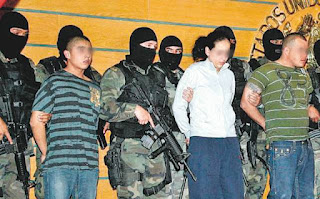"Sol Prendido" for Borderland Beat
Most of the minors apprehended in the last two decades operated in Tamaulipas, Guerrero, Nuevo León, Colima and Michoacán
What happens in this detention center is only a sample of how thousands of children and adolescents from all over the country end up in the ranks of organized crime and common crime.
The spying for which they were used a few years ago is now behind us. Now the crimes they commit are homicides, kidnappings, torture, robbery, drug sales, extortion and more.
In the country, the Secretariat of National Defense (Sedena) detained 6,282 adolescents between 15, 16 and 17 years of age, including 746 women, between January 1, 2000 and December 31, 2020, data indicate obtained via transparency. All were placed in the capacity as being qualified to be presented before the competent authorities.
Tamaulipas, Guerrero, Nuevo León, Colima and Michoacán are the states where the Army has made the largest arrests. In Tamaulipas 1,157 adolescents were apprehended.
Some factors that lead a minor to be attracted or co-opted for crime are family disintegration, lack of economic resources, violent family issues, use of substances, the power offered by weapons and money, feeling identified with a criminal group, a parent is in jail, or a relative belongs to a cartel and the narcoculture.
Carlos Vilalta, a security specialist, highlights that one of the biggest problems is family disintegration. In his prison investigations in Mexico City, and that could be extrapolated to other entities, he has found that, in crimes against property or other more violent crimes such as kidnapping and homicide, a factor to commit them was growing up where one of the parents was missing.
The same as the use of substances and to function from a young age in prison environments.
"There has been a high proportion whose family members had been in jail or who grew up in an environment where there was insufficient supervision, there was substance use and surely risky behaviors associated with such use," says the also a member of CentroGeo.
Matías was the director of the Zacatecas Comprehensive Juvenile Care and Internment Center and sums up this problem in one sentence: "these are children who’ve had their childhood stolen." The official, who asked to change his name for fear of organized crime in the entity, lists different circumstances by which adolescents are attracted to these groups.
“The vast majority of young people want to feel identified. In Zacatecas there are many rural areas, as in many parts of the Republic, ranches that do not have enough resources to get ahead. Then these people come and offer them money, weapons, power and they are dazzled, ”he assures.
The other is the lack of affection in the family nucleus and, it coincides with what Vilalta says, having dysfunctional families and growing up in a prison environment.
“These groups welcome them, they pamper them. They feel loved in their own way, they feel identified, unlike the greats who 'turncoat' defending the cartel that brings them the most benefits. Teenagers identify themselves, they get tattooed just like the cartel, ”he laments.
Added to this is that some follow in the footsteps of their parents when visiting them in prisons.
“It is like parents who are policemen, children want to be policemen, accountants or journalists. The idea is that: to follow in the footsteps of their parents and suddenly they know the prisons from an early age. For them it is normal ”, he emphasizes.
According to the report Recruitment and use of girls, boys and adolescents by criminal groups, of the National Citizen Observatory and the Network for the Rights of the Child in Mexico, it is estimated that around 250 thousand minors are at risk of being recruited and used by criminal groups.
In recent days, President Andrés Manuel López Obrador assured that thanks to scholarships and programs such as Young People Building the Future, they have made it difficult to recruit minors. However, so far no evaluation, study or evidence has been presented by the government to confirm the decline in recruitment.
For Carlos Vilalta it is not only an economic question. You have to study the origin and this has to do with family unity and the support of schools, guiding children and adolescents through an orientation, a vocation.
“The idea is good, from Youth Building the Future, but I don't think there has been an evaluation of this program in terms of reducing antisocial behaviors,” he explains.










The title is misleading..6,000 can't be arrested at one time.
ReplyDeleteBut after reading the article it is better understood 6,282 were arrested through out the years.
"President AMLO assured that thanks to scholarships and programs such as Young People Building the Future,they have made it difficult to recruit minors" 😅🤣😅🤣😅🤣
ReplyDeleteI'm sure just like the false homicide rates & violence curbed.
DeleteEconomic failures by state & government has led to what Mexico is experiencing. Along with poor judgment by adolescents who unfortunately knows the value of living of hard work to achieve success.
These findings can best be exemplified where communities of poverty and economic challenges are displayed. Look around throughout your community and see for yourself.
Still goes on today easy money relatives friends and cartels take advantage of minors when they want to leave they threaten their families f##k Cowards if they're so macho why don't they do the job Cowards and Fags those guys ain't crap in the USA only in their turf they threaten everyone but once upon a time they were crash Dummies and Errand boys for others And other idiots think they're glamorous.
ReplyDeleteTitle spell check 😊
ReplyDelete